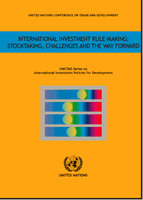Yellow Series: International Investment Rule-making: Stocktaking, Challenges and the Way Forward
The network of international investment agreements (IIAs) has expanded to encompass more than 5,700 different agreements, with almost every country in the world being part to at least one of the bilateral investment treaties, double taxation treaties and other international agreements with investment provisions (such as free trade agreements and economic cooperation agreements) that make up this system.
The universe of IIAs has not only grown in numbers, but also in complexity. Agreements increasingly overlap, as they are concluded at the bilateral, regional, inter-regional, sectorial and multilateral level. And they become more multifaceted, as they cover not only investment issues per se, but also related issues such as trade, services, intellectual property, industrial policies, labour issues, movement of personnel, environmental concerns, and others.
In the absence of a global body administering the process, international investment rulemaking lacks system-wide coordination, and countries continue to conclude investment treaties on an individual basis, thereby further perpetuating and accentuating the existing IIA patchwork - the so-called "spaghetti bowl".
While these developments offer important opportunities, the increasingly complex and rapidly evolving IIA universe also poses major challenges for States and firms alike.
• The challenges for countries include keeping the treaty network consistent and transparent, and - above all - formulating the "right" agreements in terms of balancing the interests of host countries, home countries and foreign investors, as well as strengthening the development dimension.
There is a risk that the IIA system could eventually degenerate into an increasingly non-transparent hodgepodge of diverging rules that countries, especially capacity-constrained developing countries, find more and more difficult to cope with.
An international investment framework remains an important goal, although there is currently little prospect to make substantial progress in this area. A collective effort could significantly contribute to making the existing system of international investment rules function more effectively and efficiently, and making it more conducive to growth and development.
















